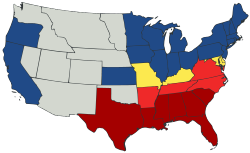User:LukeRun82
| This is a Wikipedia user page. This is not an encyclopedia article or the talk page for an encyclopedia article. If you find this page on any site other than Wikipedia, you are viewing a mirror site. Be aware that the page may be outdated and that the user whom this page is about may have no personal affiliation with any site other than Wikipedia. The original page is located at https://en.wikipedia.org/wiki/User:LukeRun82. |
Since receiving a degree in foreign languages (Brazilian Portuguese) in 2005, I've also finished a BS in Chemical Engineering from U of I in 2009, which I've used to work as a process engineer in renewable energy and the oil and gas industry in various locations in the United States. I have been an active hobby historian since my youth, especially American political, social, military and economic history and I am meticulous about original sourcing and quantifiable information. Currently I am working as a licensed professional engineer in the State of Texas.
Slavery
[edit]
Slavery was a major cause of disunion [1]. Although there were opposing views even in the Union States[2][3], most northern soldiers were largely indifferent on the subject of slavery [4], while Confederates fought the war, in large measure, to protect southern society, and slavery was an integral part of it.[5] From the anti-slavery perspective, the issue was primarily about whether the system of slavery was an anachronistic evil that was incompatible with republicanism. The strategy of the anti-slavery forces was containment—to stop the expansion and thus put slavery on a path to gradual extinction.[6] The slave-holding interests in the South denounced this strategy as infringing upon their Constitutional rights.[7] Southern whites believed that the emancipation of slaves would destroy the South's economy, due to the large amount of capital invested in slaves and fears of integrating the ex-slave black population.[8]
Slavery was illegal in much the North, having been outlawed in the late 18th and early 19th centuries. It was also fading in the border states and in Southern cities, but it was expanding in the highly profitable cotton districts of the rural South and Southwest. Subsequent writers on the American Civil War looked to several factors explaining the geographic divide.
- ^ Gallagher, Gary (February 21, 2011). Remembering the Civil War (Speech). Sesquicentennial of the Start of the Civil War. Miller Center of Public Affairs UV: C-Span. Retrieved August 29, 2017.
Issues related to the institution of slavery precipitated secession... It was not states' rights. It was not a tariff. It was not unhappiness with manner and customs that led to secession and eventually to war. It was a cluster of issues profoundly dividing the nation along a fault line delineated by the institution of slavery.
- ^ McPherson, James M. (March 1, 1994). What They Fought For 1861-1865. Louisiana State University Press. p. 62. ISBN 9780807119044.
Chauncey H. Cooke a Private in Company G 25th Wisconsin wrote in January, 1863 : I have no heart in this war if the slaves cannot go free. Our cause is nobler even than the Revolution, for they fought for their own freedom, while we fight for that of another race. Walter S. Poor entered the war a private on 4/27/1861 at New York City, NY. In Company B 10th NY Infantry. On 3/29/1864 he was commissioned into Field & Staff NC Union 2nd Infantry where he rose in rank to Lieutenant -Colonel. He wrote in 1861-1862 : If the doom of slavery is not sealed by the war, I shall curse the day I entered the Army, or lifted a finger in the preservation of the Union,
{{cite book}}: Cite has empty unknown parameters:|dead-url=and|subscription=(help) - ^ McPherson, James M. (April 3, 1997). For Cause and Comrades. Oxford University Press. p. 39. ISBN 9780195090239.
Sergeant William F. Pippey of Company H 29th Massachusetts, discharged as a 2nd Lieutenant for disability in 1863 wrote in 1862 :If anyone thinks this Army is fighting to free the Negro, they are terribly mistaken. Brevet Brig-General Charles Sheils Wainwright while a Major in the 1st NY Light Artillery in 1861-1862 said, If Lincoln caves in to the Black Republicans and makes this an abolition war, I for one will be sorry I ever lent a hand to it.
{{cite book}}: Cite has empty unknown parameters:|dead-url=and|subscription=(help) - ^ Gallagher, Gary (February 21, 2011). Remembering the Civil War (Speech). Sesquicentennial of the Start of the Civil War. Miller Center of Public Affairs UV: C-Span. Retrieved August 29, 2017.
The loyal citizenry initially gave very little thought to emancipation in their quest to save the union. Most loyal citizens, though profoundly prejudice by 21st century standards, embraced emancipation as a tool to punish slave holders, weaken the confederacy, and protect the union from future internal strife. A minority of the white populous invoked moral grounds to attack slavery, though their arguments carried far less popular weight than those presenting emancipation as a military measure necessary to defeat the rebels and restore the Union.
- ^ Eskridge, Larry (January 29, 2011). "After 150 years, we still ask: Why 'this cruel war'?". Canton Daily Ledger. Canton, Illinois. Archived from the original on February 1, 2011. Retrieved January 29, 2011.
{{cite news}}: Unknown parameter|deadurl=ignored (|url-status=suggested) (help) - ^ Weeks 2013, p. 240.
- ^ Olsen 2002, p. 237.
- ^ Chadwick, French Esnor. Causes of the civil war, 1859–1861 (1906) p. 8
